|
|
|
Sort Order |
|
|
|
Items / Page
|
|
|
|
|
|
|
| Srl | Item |
| 1 |
ID:
155087
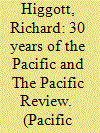

|
|
|
|
|
| Summary/Abstract |
This paper is a review of scholarship found in the pages of The Pacific Review over the last 30 years. It does so in three ways: (1) it highlights issues in the theory and practice of the international relations, strategic studies, political culture and political economy of the Asia Pacific region. (2) It looks at change in the region over time by an analysis of the shifting fortunes of the major regional powers, namely Japan, China and Indonesia and the challenges they, and China in particular, post to US regional hegemony. (3) It looks at regional process reflected in the fate and fortunes of the regional integrative project in the key policy domains of trade, finance and the environment. The paper concludes with a reflection on the strains on the regional political and economic orders by the rise in nationalist politics.
|
|
|
|
|
|
|
|
|
|
|
|
|
|
|
|
| 2 |
ID:
167291
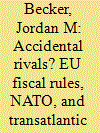

|
|
|
|
|
| Summary/Abstract |
Both theorists and practitioners continue to show interest in transatlantic burden-sharing. Resource allocation choices – both to and within defense budgets – are grand strategic choices, and membership in alliances and security communities affects how states make those choices. International security and political economy scholarship offers plausible explanations for transatlantic imbalances in military expenditures. However, NATO allies and EU member-states have pledged to one another not just to spend more on defense, but to allocate more defense resources to equipment modernization. Current scholarship does not fully explain the sources of such within-budget choices, which would help anticipate the likelihood of such pledges succeeding. Building on work by security scholars, defense and political economists, and scholars of interorganizational relations, I argue that stringent fiscal rules dampen the kind of defense spending NATO and EU strategists seek. Governments respond to increasingly stringent fiscal rules by reducing overall defense expenditures, while at the same time shifting existing defense resources to personnel, and away from equipment and operational expenditures. I find evidence in support of this argument by using education levels in the states in question as instruments for fiscal rules. This phenomenon represents a significant risk for important transatlantic strategic initiatives, namely NATO’s Wales pledge on defense investment.
|
|
|
|
|
|
|
|
|
|
|
|
|
|
|
|
| 3 |
ID:
157553


|
|
|
|
|
| Summary/Abstract |
What factors generate financial fragility in open economies? Existing research assumes that the development of these conditions is more likely to emerge under some configurations of domestic economic and political attributes. We examine the development of financial fragility through the ontological lens of the new interdependence approach, which assumes that global factors can be as important as local factors in generating outcomes. We analyze global financial conditions from 1978 to 2009 and argue that contemporary global finance is an oscillating system that generates boom and bust capital flow cycles. The phases of this cycle are a consequence of the scale of US net borrowing on global markets: when the United States is a large net importer of foreign capital, other economies struggle to attract foreign capital and are substantially less likely to develop fragile financial positions; when US net capital imports fall, other economies receive an abundance of foreign capital, and financial fragility becomes more likely. In contrast, we find little evidence that cross-national variation in political institutions or financial systems explains why fragility develops, although some regional interdependencies are evident. We conclude that global conditions drive the probability of crises occurring someplace in the system, while local outcomes appear to be idiosyncratic.
|
|
|
|
|
|
|
|
|
|
|
|
|
|
|
|
| 4 |
ID:
098762
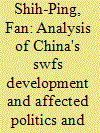

|
|
|
| 5 |
ID:
099123
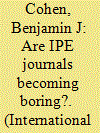

|
|
|
| 6 |
ID:
192097
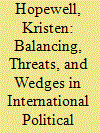

|
|
|
|
|
| Summary/Abstract |
Despite considerable tensions, China and India formed a surprising alliance at the WTO. Their alliance proved highly successful, bringing an end to American dominance and sharply curtailing the ability of the US to set the rules of global trade. However, the article shows, a key risk of soft balancing within an international institution is that, if successful, it may cause the dominant power to abandon the institution altogether. The US responded to China and India’s soft balancing by turning away from the WTO, actively undermining its rules and enforcement mechanism, and pursuing its interests through bilateral channels. The article thus identifies a distinct and previously unrecognized wedge strategy—vertical forum-shifting, or moving the action from international institutions to bilateral negotiations, to split an adversary coalition.
|
|
|
|
|
|
|
|
|
|
|
|
|
|
|
|
| 7 |
ID:
163077
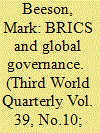

|
|
|
|
|
| Summary/Abstract |
The impact of rising powers generally and the BRICS - Brazil, Russia, India, China and South Africa - in particular on the existing global order has become controversial and contested. Donald Trump’s nationalist foreign policy agenda has raised questions about the BRICS willingness and capacity to provide leadership in place on an American administration that is increasingly inward looking. As a result, the rise of BRICS poses potential normative and structural challenges to the existing liberal international order. Given its geoeconomic significance, China also poses a potential problem for the other BRICS, as well as the governance of the existing order more generally. Consequently, we argue that it will be difficult for the BRICS to maintain a unified position amongst themselves, let alone play a constructive role in preserving the foundations of ‘global governance’.
|
|
|
|
|
|
|
|
|
|
|
|
|
|
|
|
| 8 |
ID:
120810
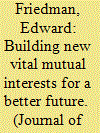

|
|
|
|
|
| Publication |
2013.
|
| Summary/Abstract |
This analysis of the dangerous forces increasingly dynamizing Beijing-Washington relations explains why the usual proposals for increasing the cooperative aspects of USA-PRC relations will not succeed. It builds on the policy analysis and policy proposals of others who understand what a disaster it would be if China-America relations were to continue to grow worse. It makes a suggestion for restructuring the institutions of the international political economy so as to construct fundamental over-lapping interests between America and China. The author finds that without some difficult and basic changes in the relations, worst case outcomes become ever more probable.
|
|
|
|
|
|
|
|
|
|
|
|
|
|
|
|
| 9 |
ID:
148260
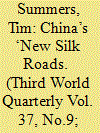

|
|
|
|
|
| Summary/Abstract |
This paper argues that the Chinese government’s ‘belt and road’ initiative – the Silk Roads vision of land and maritime logistics and communications networks connecting Asia, Europe and Africa – has its roots in sub-national ideas and practices, and that it reflects their elevation to the national level more than the creation of substantially new policy content. Further, the spatial paradigms inherent in the Silk Roads vision reveal the reproduction of capitalist developmental ideas expressed particularly in the form of networks, which themselves have become a feature of contemporary global political economy. In other words, the Silk Roads vision is more of a ‘spatial fix’ than a geopolitical manoeuvre.
|
|
|
|
|
|
|
|
|
|
|
|
|
|
|
|
| 10 |
ID:
176546
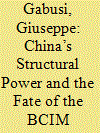

|
|
|
|
|
| Summary/Abstract |
In 2013, China and India officially established an economic corridor (the Bangladesh–China–India–Myanmar Economic Corridor, BCIM-EC) that would cut across Myanmar and Bangladesh. But while the formal process of cooperation among the four countries is in place, many obstacles to its implementation remain at the international, national and local levels. Is meaningful collaboration possible within the BCIM-EC framework? In terms of two dimensions of structural power as conceptualised by Susan Strange, security and trade, China’s structural power in Myanmar is much stronger than India’s. It is therefore likely that this imbalance will prevent the BCIM-EC project, which currently appears to be overshadowed by China’s Belt and Road Initiative, from having a fruitful outcome.
|
|
|
|
|
|
|
|
|
|
|
|
|
|
|
|
| 11 |
ID:
194986


|
|
|
|
|
| Summary/Abstract |
By introducing the Belt and Road Initiative (BRI), an international infrastructure investment strategy, China attracted a lot of attention. China's approach to state capitalism has opened a window of opportunity for other infrastructure investment strategies. In response, the world's largest and liberally minded economies, such as the United States of America, Japan, and the European Union, have focused on connectivity and embarked on similar strategies. In this article, I conduct a comparative analysis of infrastructure investment strategies. I analyze key tenets of the BRI and international responses through the prism of principles, priorities, funding, financing, governance, and implementation. The comparison of strategies highlights more commonalities than differences, and I identify several instances in which liberal economies act in contradiction to their variety of capitalism. The results suggest that China has opened a window of opportunity for proactive infrastructure investment strategies, and major economies have responded in kind. With overlapping emphases in similar geographic regions, these strategies lead to competition. Consequently, recipient countries profit from an advantageous negotiating position when seeking to attract foreign direct investment in infrastructure projects.
|
|
|
|
|
|
|
|
|
|
|
|
|
|
|
|
| 12 |
ID:
165907
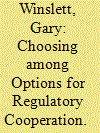

|
|
|
|
|
| Summary/Abstract |
When states face a regulatory difference that impedes commerce between them, they have a range of options to choose from in how to pursue regulatory cooperation on that issue. They may attempt to unilaterally impose their position, attempt to negotiate binding agreements, promote mutual recognition, utilize networked governance, create private standards, rely on business self-regulation, or choose not to pursue cooperation. Each of these choices has implications for the commerce and international relations on that issue, and so the choice of policy route is of vital importance. This article builds on lobbying, regulation, and trade scholarship to advance a theory that explains how states choose a regulatory cooperation pathway.
|
|
|
|
|
|
|
|
|
|
|
|
|
|
|
|
| 13 |
ID:
049926
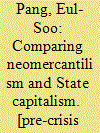

|
|
|
|
|
| Publication |
Malaysia, Strategic and Security Studies Unit (UPSK), 2000.
|
| Description |
26p.
|
| Series |
UPSK Occasional Paper 6/00
|
| Standard Number |
9832237068
|
|
|
|
|
|
|
|
|
|
|
|
Copies: C:1/I:0,R:0,Q:0
Circulation
| Accession# | Call# | Current Location | Status | Policy | Location |
| 044987 | 330.122/PAN 044987 | Main | On Shelf | General | |
|
|
|
|
| 14 |
ID:
119718
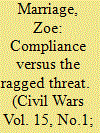

|
|
|
|
|
| Publication |
2013.
|
| Summary/Abstract |
Northern development policies in African countries affected by war are shaped by security concerns and have neoliberal and realist elements. The neoliberal economic policy purports to be inclusive, but when it meets non-compliance, realist ambitions are pursued through the use or strategic oversight of force. The liberalisation of mining in Katanga, Democratic Republic of Congo, was promoted through northern policy and was exclusive in strengthening unaccountable domestic governance. This marginalised the majority of the population politically and economically and reinforced the international political economy. Consequently, northern intervention has increased insecurity in Congo, and is potentially destabilising in contravening reciprocity in international relations.
|
|
|
|
|
|
|
|
|
|
|
|
|
|
|
|
| 15 |
ID:
155488
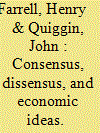

|
|
|
|
|
| Summary/Abstract |
During the recent economic crisis, Keynesian ideas about fiscal stimulus briefly seemed to form the basis of a new expert consensus about how to deal with demand shocks. However, this apparent consensus soon collapsed into a continuing dissensus, with important consequences for policy. Neither conventional bargaining accounts nor existing theories of the role of ideas in policy outcomes easily explain the arc of international responses to the Great Recession. In this article, we propose that sociological arguments about professions, in conjunction with those about spaces of political contention as ecologies, provide a better understanding of the puzzle of Keynesianism’s rise and decline. The internal dynamics of prestige and status within the profession of economics intersected with policy arguments between states so as to make macroeconomic policy a “hinge” issue, over which coalitions in both ecologies contended. This explains how Keynesian economists and political actors worked together in the first phase of the crisis to advocate for and implement fiscal stimulus. It also explains why aggrieved policy actors, who did not favor stimulus, could help disrupt the apparent consensus in the second phase of the crisis by promoting the views of dissident economists.
|
|
|
|
|
|
|
|
|
|
|
|
|
|
|
|
| 16 |
ID:
086443
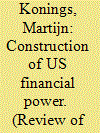

|
|
|
|
|
| Publication |
2009.
|
| Summary/Abstract |
Critical work in international political economy (IPE) has sought to theorise US financial power through the concept of structural power, intended as a means to go beyond state-centric conceptions of political power and to trace the state's interaction with socio-economic forces. But due to the tendency to ontologise the distinction between state and market, IPE has not been fully successful in articulating the linkages between structural power and state power. The article then examines literature in the field of cultural political economy (CPE), which emphasises the constitutive importance of the cultural norms and practices situated at the level of everyday life. The CPE literature fails to challenge established IPE accounts in some key respects, and the article relates this to its conception of political power. The article develops an institution-based perspective that is more suitable to theorising the linkages between structural power and state power, and then proceeds to develop an interpretation of the construction of American financial power over the course of the 20th century. It reinterprets some of the key moments in the history of US and global finance and re-examines notions of American financial decline.
|
|
|
|
|
|
|
|
|
|
|
|
|
|
|
|
| 17 |
ID:
110207
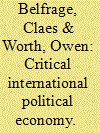

|
|
|
|
|
| Publication |
2012.
|
| Summary/Abstract |
This special issue critically assesses the development of 'Critical International Political Economy' (IPE) and seeks to expand upon its theoretical foundations in order to ensure the discipline's openness and diversity. This introduction will set the stage for this endeavour by conceptualising the historical development of critical IPE and by outlining the challenge ahead.
|
|
|
|
|
|
|
|
|
|
|
|
|
|
|
|
| 18 |
ID:
151185
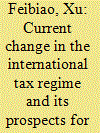

|
|
|
| 19 |
ID:
117040
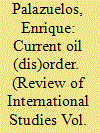

|
|
|
|
|
| Publication |
2012.
|
| Summary/Abstract |
This article has been constructed under the premise that International Political Economy provides the appropriate analytical tools for understanding the characteristics and performance of oil in economic and political relations. The article argues the need to articulate three levels of analysis (major players, scenarios, and exchange mechanisms) in order to understand the economic and political relations that underpin oil exchange during last decades. The central conclusion is that the current oil system is characterised by a set of asymmetric, unstable, and ungovernable relations, whose consequences are unpredictable but not necessarily traumatic.
|
|
|
|
|
|
|
|
|
|
|
|
|
|
|
|
| 20 |
ID:
078890
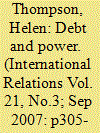

|
|
|
|
|
| Publication |
2007.
|
| Summary/Abstract |
The United States' borrowing poses a potential threat to its long-term external power. This is not because the United States' fiscal debt is large in relative terms, or because rising debt necessarily threatens a state's power, but because the United States has now indebted itself to China, and this financial relationship fundamentally changes the political terms on which the United States has borrowed since the 1960s. The consequences of that change may force American presidents to consider questions about the domestic viability of their foreign policy in a way that has not been necessary since the beginnings of the Cold War. Neither liberals nor realists are equipped to understand the significance of this change, because of the way in which they conceive power in relation to the interaction between domestic and international politics.
|
|
|
|
|
|
|
|
|
|
|
|
|
|
|
|
|
|
|
|
|